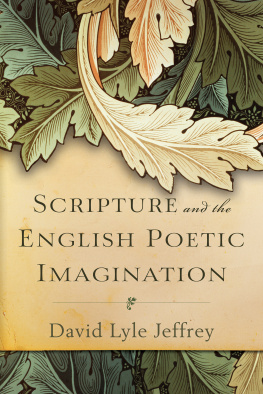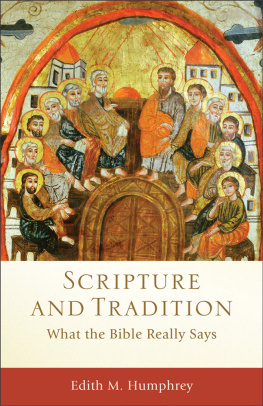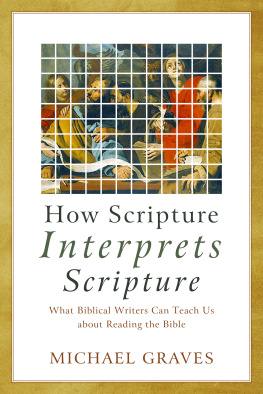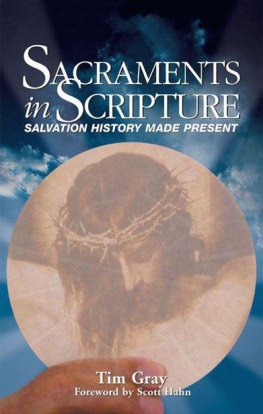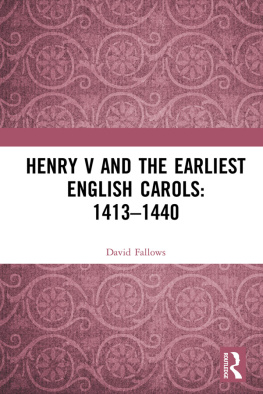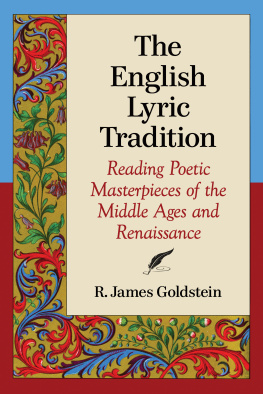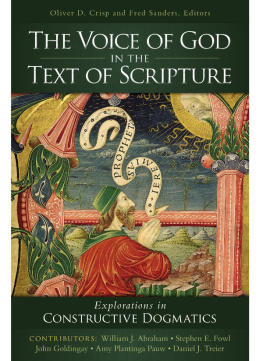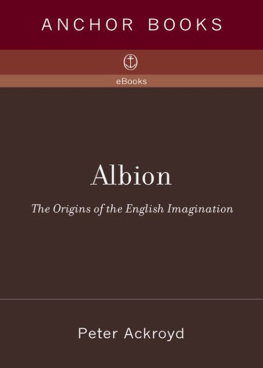David Lyle Jeffrey - Scripture and the English Poetic Imagination
Here you can read online David Lyle Jeffrey - Scripture and the English Poetic Imagination full text of the book (entire story) in english for free. Download pdf and epub, get meaning, cover and reviews about this ebook. year: 2019, publisher: Baker Publishing Group, genre: Religion. Description of the work, (preface) as well as reviews are available. Best literature library LitArk.com created for fans of good reading and offers a wide selection of genres:
Romance novel
Science fiction
Adventure
Detective
Science
History
Home and family
Prose
Art
Politics
Computer
Non-fiction
Religion
Business
Children
Humor
Choose a favorite category and find really read worthwhile books. Enjoy immersion in the world of imagination, feel the emotions of the characters or learn something new for yourself, make an fascinating discovery.
- Book:Scripture and the English Poetic Imagination
- Author:
- Publisher:Baker Publishing Group
- Genre:
- Year:2019
- Rating:5 / 5
- Favourites:Add to favourites
- Your mark:
- 100
- 1
- 2
- 3
- 4
- 5
Scripture and the English Poetic Imagination: summary, description and annotation
We offer to read an annotation, description, summary or preface (depends on what the author of the book "Scripture and the English Poetic Imagination" wrote himself). If you haven't found the necessary information about the book — write in the comments, we will try to find it.
Scripture and the English Poetic Imagination — read online for free the complete book (whole text) full work
Below is the text of the book, divided by pages. System saving the place of the last page read, allows you to conveniently read the book "Scripture and the English Poetic Imagination" online for free, without having to search again every time where you left off. Put a bookmark, and you can go to the page where you finished reading at any time.
Font size:
Interval:
Bookmark:
2019 by David Lyle Jeffrey
Published by Baker Academic
a division of Baker Publishing Group
PO Box 6287, Grand Rapids, MI 49516-6287
www.bakeracademic.com
Ebook edition created 2019
All rights reserved. No part of this publication may be reproduced, stored in a retrieval system, or transmitted in any form or by any meansfor example, electronic, photocopy, recordingwithout the prior written permission of the publisher. The only exception is brief quotations in printed reviews.
Library of Congress Cataloging-in-Publication Data is on file at the Library of Congress, Washington, DC.
ISBN978-1-4934-1689-9
Unless indicated otherwise, Scripture quotations are from the King James Version of the Bible.
Scripture quotations labeled NKJV are from the New King James Version. Copyright 1982 by Thomas Nelson. Used by permission. All rights reserved.
Scripture quotations labeled NRSV are from the New Revised Standard Version of the Bible, copyright 1989 National Council of the Churches of Christ in the United States of America. Used by permission. All rights reserved.
The poem Adam is reprinted from COLLECTED EARLIER POEMS by Anthony Hecht, copyright 1990 by Anthony E. Hecht. Used by permission of Alfred A. Knopf, an imprint of the Knopf Doubleday Publishing Group, a division of Penguin Random House LLC. All rights reserved.
The poem Supernatural Love is reprinted from SUPERNATURAL LOVE: POEMS 19761992 by Gjertrud Schnackenberg. Copyright 2000 by Gjertrud Schnackenberg.
Cover
Half Title Page
Title Page
Copyright Page
Preface
Introduction
1. Poetry and the Voice of God
Part 1: Medieval Poetry and the Bible
2. Paraphrase and Theater: Bonaventures Retracing the Arts to Theology and Literary Evangelism
3. Quotation and Inflection: Dante and Chaucer on the Sermon on the Mount
4. Egyptian Gold: Biblical Transformations of Ovid in The Canterbury Tales
5. Irony and Misreading: Courtly Love and Marriage according to Henry VIII
Part 2: Scripture and the English Poetic Imagination after the Reformation
6. Poetry in Preaching, Prayer, and Pastoral Care: John Donne and George Herbert
7. Habitual Music: The Influence on English Poets of the King James Bible
8. Conclusion and Form for the Personal in Modern Poetry
9. The Conversion Poems of Margaret Avison
11. Epiphanies of a Fathers Love: Anthony Hecht and Gjertrud Schnackenberg
Epilogue: Can Faustus Be Saved? The Fragile Future of Our Common Book
Index
Back Cover
T his volume of new and selected essays is threaded together to tell a story to which I have committed my scholarly life over the last fifty yearsnamely, of the magnificent fruitfulness of Holy Scripture in the work of English poets, including dramatic as well as lyric poets from Caedmon to the present. T. S. Eliot famously, and in some considerable measure rightly, said that the Bible has had a literary effect upon English literature not because it has been considered as literature, but because it has been considered as the report of the Word of God ( Religion and Literature , 1935). There is undeniable truth in this observation; indeed, it has been a working assumption for most who have seriously considered the richness of biblical story, character, and allusion in vernacular European literatures, including myself. Yet it is not the whole truth. The history of literature since the Enlightenment bears a persistent witness to the power of biblical language, idiom, phrase, poetic style, and spiritual presence to move poets to evoke it even when belief has ostensibly been lost. It is this second truth, of the power of Scripture to fire the poetic imagination independently of prevalent religious authority, which completes the design and labor of this volume.
I have sought to be at least a little like the householder instructed unto the kingdom of heaven spoken of by Jesus in Matthews Gospel, who bringeth forth out of his treasure things new and old (Matt. 13:52). My principle of selection has accordingly been one of which I hope others than myself may approve; the essays assembled here are (to me and, I gather, others) among the most satisfying of my career. I have linked them in such a way as to outline a story basic to English literary history, especially as it pertains to lyric and dramatic poetry, and also to bear witness to the power of Holy Scripture to elevate the creative mind. Chapters 1, 2, 6, and 7 are new; chapter 4 renews an essay I began some decades ago but never till now completed; the other chapters are reworkings, some quite heavily, of earlier essays that have been well received and yet are now in need of both updating and, as I am regularly reminded, easier accessibility. For those of my readers who may wonder how I could seem to overlook in a book of this sort the epic verse of John Milton, my answer is simply that two of my former students, Dennis Danielson and Philip Donnelly, both eminent Miltonists, have written comprehensively and persuasively on Miltons biblical and theological imagination, and anything I could add here would be superfluous.
I am indebted to several publishers for their permission to incorporate work first essayed in their domains: to Oxford University Press for an extract from Conclusion and the Form of the Personal in Modern Poetry, Journal of the American Academy of Religion 43, no. 2 (1975); to Franciscan Studies for permission to extract from St. Francis and Medieval Theatre, Franciscan Studies 43, no. 21 (1983/1988); to Sage Publishing for permission to draw on Courtly Love and Christian Marriage in the Court of Henry VIII, Christianity and Literature 59, no. 3 (2010); Of Beauty and a Fathers Love: The Recrudescence of Fatherhood in Recent American Literature, Christianity and Literature 55, no. 2 (2006); and Communion, Community, and Our Common Book: Or, Can Faustus Be Saved?, Christianity and Literature 53, no. 2 (2004), a talk given at the Modern Language Association in response to being given the Lifetime Achievement Award of the Conference for Christianity and Literature in 2003 and largely preserved in its oral format; to Brazos Press for allowing me to reprint The Beatitudes in Dante and Chaucer from The Sermon on the Mount through the Centuries , ed. Jeffrey P. Greenman, Timothy Larsen, and Stephen Spenser (Brazos, 2007); to the American Bible Society for allowing me to revise Habitual Music: The King James Bible and English Literature, which first appeared in Translation That Openeth the Window: Reflections on the History and Legacy of the King James Bible , ed. David G. Burke (Society for Biblical Literature, 2009); to ECW Press for permission to revise Light, Stillness, and the Shaping Word: Conversion in the Poetic of Margaret Avison, from Lighting Up the Terrain: The Poetry of Margaret Avison , ed. David A. Kent (ECW Press, 1987); and, finally, to First Things for allowing me to revise my essay Gods Patient Stet : Richard Wilbur at 90 (2011).
I have, of course, many other obligations of gratitude than can be represented adequately here. Dominic Manganiello, Graeme Hunter, and Michael OBrien each offered suggestions on one or more of these essays at some point in the past, and poets Anthony Hecht and Margaret Avison of blessed memory, and with them Richard Wilbur, have each been a source of personal encouragement. My generous Baylor University colleagues Phillip Donnelly and Katie Calloway, and my Chinese colleagues Yang Huilin, Zhang Jing, and Liu Jiong, have offered thoughtful comments and suggestions. I am indebted also to my resourceful graduate assistant Caroline Paddock, as well as to Abigail Higgins, and last but so far from least as east is from west, to my wife, Katherine Bentley Jeffrey, whose sharp eye and not-so-frequent stet has led to many an improvement in what follows.
Font size:
Interval:
Bookmark:
Similar books «Scripture and the English Poetic Imagination»
Look at similar books to Scripture and the English Poetic Imagination. We have selected literature similar in name and meaning in the hope of providing readers with more options to find new, interesting, not yet read works.
Discussion, reviews of the book Scripture and the English Poetic Imagination and just readers' own opinions. Leave your comments, write what you think about the work, its meaning or the main characters. Specify what exactly you liked and what you didn't like, and why you think so.

